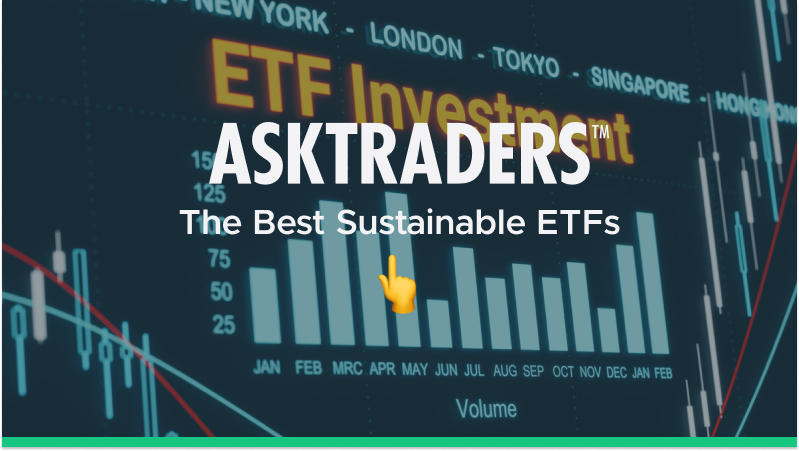With so many investors keen to get involved in ethical trading, it’s not surprising that numerous new sustainable ETFs have sprung up in recent years.
YOUR CAPITAL IS AT RISK

ETFs pull together a basket of assets from companies they have already screened to ensure they are following best practices, making it easier for ethical traders to invest with peace of mind.
To give you some ideas, we’ve put together a list of some of the best sustainable ETFs available to trade on the market.
| Symbol | ETF Name | Expense Ratio | AUM |
|---|---|---|---|
| CRBN | ISHARES MSCI ACWI LOW CARBON TARGET ETF | 0.2% | $861.15m |
| BGRN | ISHARES GLOBAL GREEN BOND ETF | 0.2% | $331.5m |
| VEGN | THE U.S. VEGAN CLIMATE ETF | 0.6% | $82.7m |
| DSI | ISHARES MSCI KLD 400 SOCIAL ETF | 0.25% | $3.99bn |
| SUSA | ISHARES MSCI USA ESG SELECT ETF | 0.25% | $5.3bn |
| SPYX | SPDR S&P 500 FOSSIL FUEL RESERVES FREE ETF | 0.2% | $1.46bn |
| SHE | SPDR SSGA GENDER DIVERSITY INDEX ETF | 0.2% | $215.93m |
Why We Chose These ETFs
Of course, all of the ETFs chosen have a focus on sustainability. However, there are other factors that influence our choices. For example, you will notice that the majority of the funds have a low expense ratio. In addition, assets under management for the majority of the funds chosen are above the $500 million mark, with only two not meeting the threshold. Diversification was also another key market for many of the funds.
Table of contents
iShares MSCI ACWI Low Carbon Target ETF
This fund, with the ticker symbol CRBN, does exactly what the name suggests, tracking low-carbon companies to allow environmentally concerned clients to ensure they are investing in companies with a commitment to lowering carbon emissions and reducing their overall carbon footprint.
While there are numerous companies aiming for a net-zero carbon footprint, the fund is not that ambitious, aiming to simply include companies less dependent on fossil fuels, with lower carbon exposure than average.
| Pros | Cons |
|---|---|
| Low cost: CRBN is a low-cost fund that focuses on environmental impact and does not claim to track companies on all ESG criteria. The current assets under management are $455.56m with an expense ratio of 0.20%. | Growth stocks: While the fund is relatively low risk, one area that could be considered a potential weakness is its exposure to many of the big-name growth stocks, which, as we saw in 2022, were impacted by rising interest rates. |
| Big-name holdings: The ETF has over 1,200 holdings, in the USA and abroad, with some big names, including Microsoft, Apple, and Amazon. |
iShares Global Green Bond ETF
The iShares Global Green Bond ETF, with the ticker symbol BGRN, only includes bonds that meet MSCI's Green Bond Principles. In short, this means that the bonds must be used to fund projects related to energy efficiency, climate adaptation, water sustainability, pollution control, green building, and other environmental issues.
There are also independent procedures that must be used by the bond issuers to evaluate and select environmental projects and to accurately report the impact these projects have had.
| Pros | Cons |
|---|---|
| Low expense ratio: The fund has an expense ratio of 0.20% and more than $300 million in assets under management. | Interest rate risk: Green bonds are fixed-income securities, which means their value is inversely related to interest rates. When interest rates rise, the value of existing bonds falls. |
US Vegan Climate ETF
The first-ever ‘vegan ETF’ hit the market in September 2019, hailed as perhaps the most specific ETF ever launched. Trading on the New York Stock Exchange under the ticker symbol VEGN, the fund is provided by European-based Beyond Advisors IC.
The fund’s prospectus states that the aim is to ‘address the concerns of vegans, animal lovers, and environmentalists by avoiding investments in companies whose activities directly contribute to animal suffering, destruction of the natural environment and climate change’.
| Pros | Cons |
|---|---|
| Strong growth: While it is tough to predict how the fund will perform long-term, it has made strong gains since its first day of trading in September 2019. | Expense ratio: The expense ratio of 0.60% for the US Vegan Climate ETF is higher than the average cost of 0.39% for socially responsible ETFs. |
iShares MSCI KLD 400 Social ETF
This sustainable ETF was first established in 2006 and tracks an index of various and diverse companies, carefully screened on environmental, social, and governance characteristics. The fund holds 400 positions spread across various sectors, including technology, healthcare, energy, and utilities.
| Pros | Cons |
|---|---|
| Diversification: Given that the fund holds a wide range of stocks across different sectors, it provides investors with strong diversification, helping to spread risk. | Tech exposure: While the fund is diversified, some of its biggest holdings include tech names such as Microsoft, Nvidia, Alphabet, and Adobe. This means that a downturn in the tech sector, like we saw in 2022, will weigh on its performance. |
| Big name holdings: Stocks held in the fund include Microsoft, Facebook, Verizon, Visa, Home Depot, Procter & Gamble, and Alphabet. | |
| Expense ratio: The fund has around $2.19 billion in assets under management, with an expense ratio of 0.25%. |
iShares MSCI USA ESG Select ETF
This is another iShares fund with access to over 100 large and mid-cap stocks from US companies that meet environmental, social, and governance criteria.
| Pros | Cons |
|---|---|
| Diversification: The fund excludes all tobacco companies. However, it includes organisations from a diverse range of sectors, including consumer goods, healthcare, and financial services. | Volatility: The fund holds fewer stocks than some of the other funds in this list, with a heavy weighting to tech stocks, which means it could be exposed to more volatility. |
| Big name holdings: Holdings include Microsoft, Google, Apple, EcoLab, Kellogg, Pepsi, and Accenture. | |
| Low expense ratio: The fund has an asset under management of $1.46b and an expense ratio of 0.25%. |
SPDR S&P 500 Fossil Fuel Reserves Free ETF
With the ticker symbol SPYX, this is one of the newer funds on the market, in operation since late 2015. This fund has a specific aim and strategy.
It tracks a subset of the S&P 500 Index, removing companies that own fossil fuel reserves, meaning crude oil, natural gas and thermal coal, and effectively creating an S&P 500 Fossil Fuel Free Index, with the aim of replicating roughly the same returns as the full index.
| Pros | Cons |
|---|---|
| Diversification: With the fund tracking a subset of the S&P 500, it has 486 holdings, providing investors with diversification. and has certainly had success, with shares returning around 15% in the first three years of operation. It currently has $643.50m in assets under management, with an expense ratio of 0.25%. | Tracking of the S&P 500 subset: While it is a positive, the tracking of the index can also be considered a negative during times of market downturns. |
| Tracking of the S&P 500 subset: This alignment ensures that SPYX's performance closely mirrors the collective movement of the US economy, offering investors a reliable gauge of the broader market's trajectory. As the US economy flourishes, SPYX naturally benefits, providing investors with a shared path of growth. |
SPDR SSGA Gender Diversity Index ETF
With the appropriate ticker symbol of SHE, this fund from State Street Global Advisors tracks the performance of companies that are working towards gender equality and actively encouraging gender diversity on their boards of directors and within their senior management teams.
This ETF has around 170 positions, with stocks from diverse companies, all of which have a commitment to gender equality, and multiple women on their boards.
| Pros | Cons |
|---|---|
| Big-name holdings: Stocks in the fund include Coca Cola, Johnson & Johnson, Home Depot, MasterCard and PepsiCo. | Limited diversification: SHE's focus on gender diversity criteria may limit its diversification compared to broader market ETFs. This could increase its volatility in the short term. |
| Low expense ratio: At the time of writing, the fund has total assets under management of $132.34m, with a gross expense ratio of 0.20%. |
Why Invest in Sustainable ETFs?
Exchange-traded funds (ETFs) take the benefits of mutual fund investing to the next level. Some of the advantages of ETFs are as below.
Lower cost: Since you can trade ETFs like stock, you can buy a diversified portfolio with the same low commission. Also, ETFs typically have lower expense ratios than mutual funds.
Diversification: The are a variety of ETFs covering all major indices, sectors, industries, sizes, strategies, international (i.e. developed, emerging, and frontier markets), specific countries, and even exotic ETFs (commodities, short or bear funds, and leveraged funds).
Liquidity: ETFs trade on a market exchange, so they can be traded (intraday) anytime stocks trade, not just at the end of the day. This can be an important benefit when volatility is high.
Tax efficiency: Since most ETFs are not actively managed but are programmed to follow a specific index, they may not have high capital gains and income that are required to be passed on to owners each year. This means investors have more control over when they incur taxes.
YOUR CAPITAL IS AT RISK
What to Know Before Investing in Sustainable ETFs
There are a few factors that you need to consider when choosing sustainable ETFs to invest in.
Level of assets: The best ETF should have a minimum level of assets. A common threshold is at least $10 million. An ETF with assets below this minimum is likely to have a limited degree of investor interest.
Trading activity: You need to take into account a sufficient volume of trades involved on a daily basis for the ETF. Trading volume is an excellent indicator of liquidity, regardless of the asset class.
Underlying assets: Additionally, consider the underlying index or asset class of the ETFs before deciding to invest in them. From the point of view of diversification, it may be preferable to invest in an ETF that is based on a broad, widely followed index.









